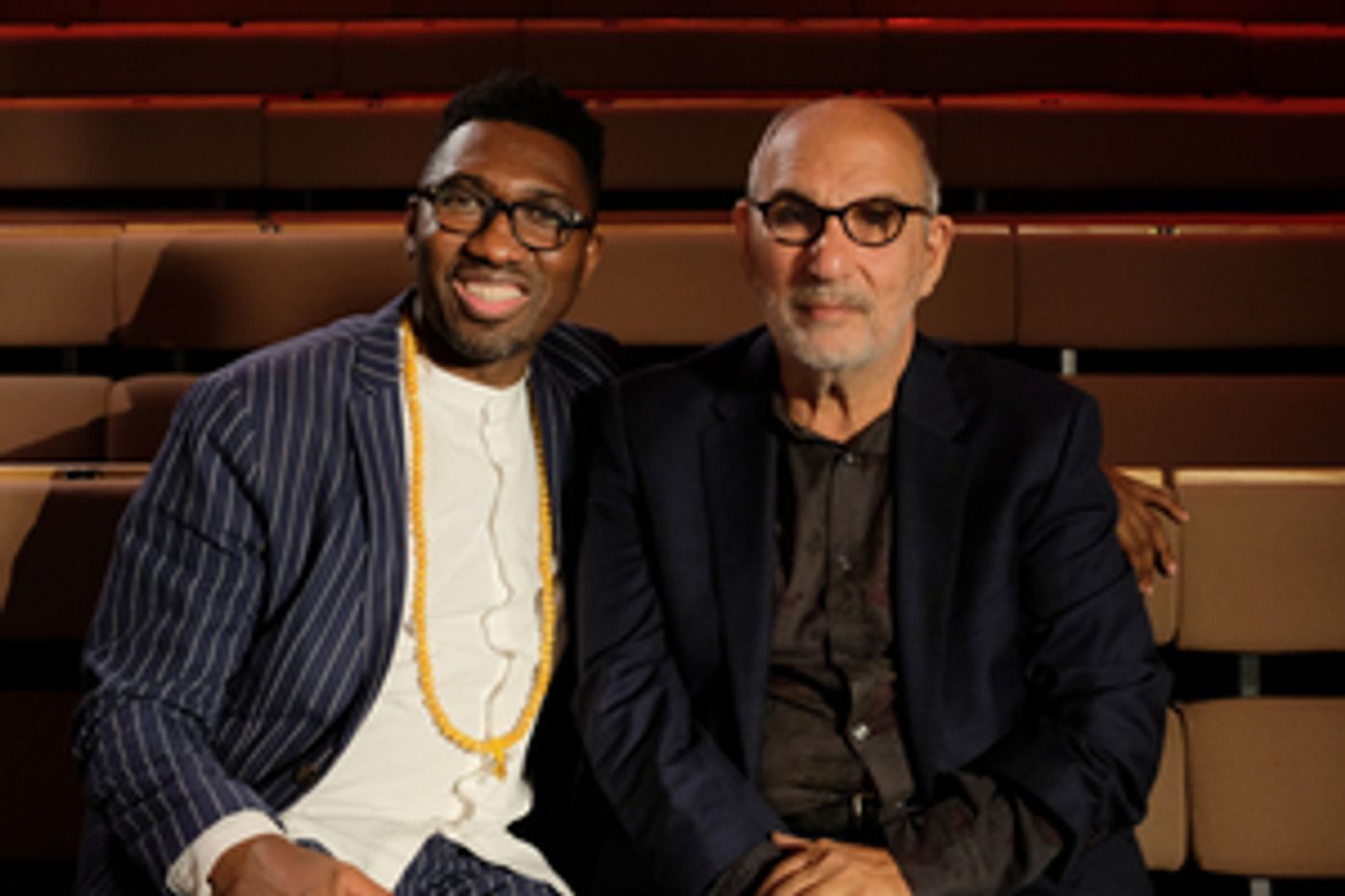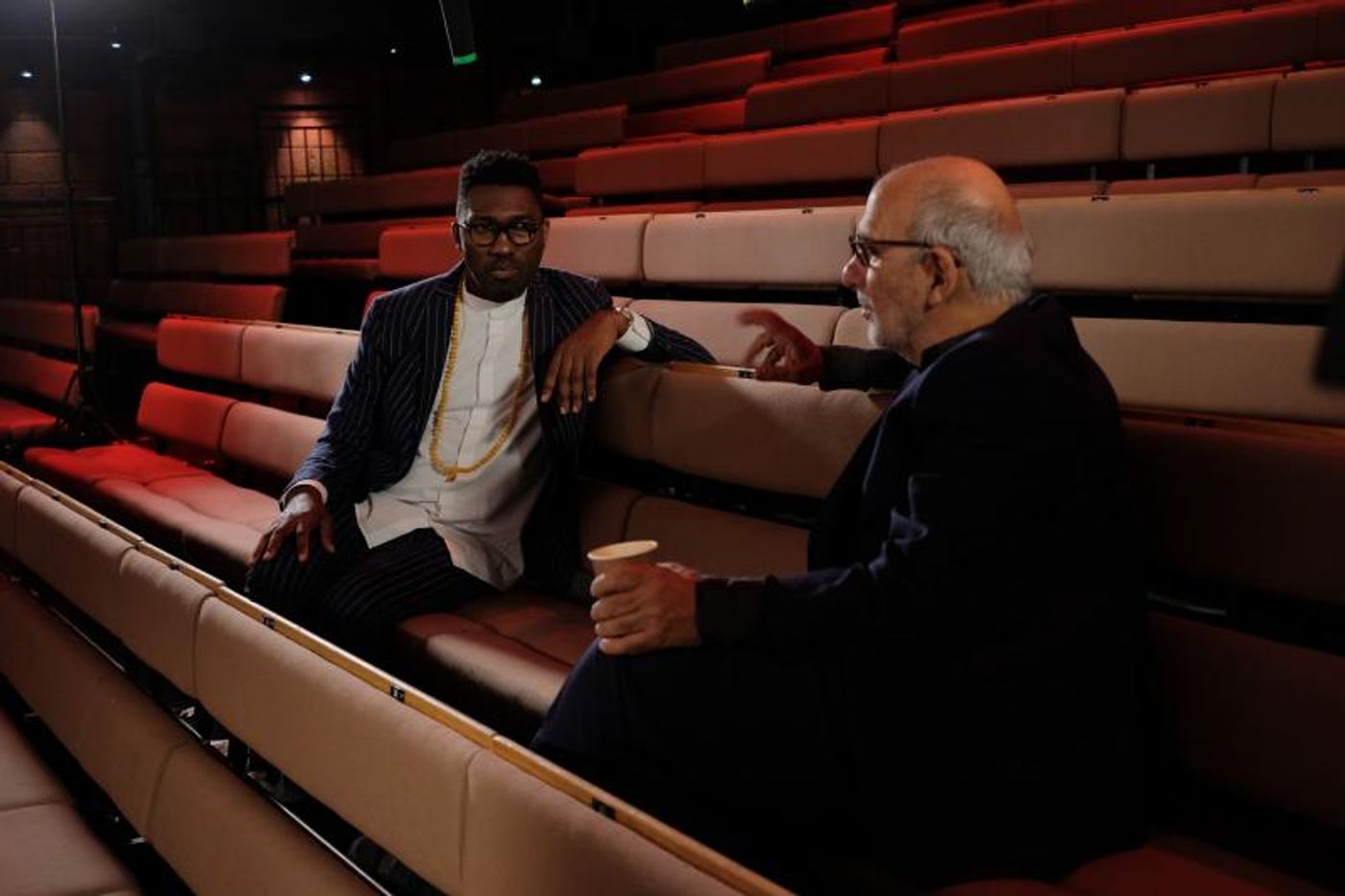
in imagine... My Name is Kwame
Kwame Kwei-Armah is the Artistic Director of the Young Vic, which is marking its 50th anniversary this year. As part of the celebrations, Kwei-Armah is the subject of an episode of the latest BBC imagine... series. We spoke to him about lockdown and going back over his childhood as part of the project.
How are you finding lockdown?
Lockdown has been a combination of frustration and opportunity - although "opportunity" is a strange word. What I mean by that is I've had the opportunity to see my family multiple times a day. I spend most of my days on Zoom, but at least when I go on a toilet break, I'm seeing my family. That's been pretty wonderful.
As a writer, I'm used to locking myself away in a garage and firing away at work until I got to the end of a draft. In a way, that muscle was still there, so staying home didn't feel so bad. I think the hardest thing about this lockdown is having a theatre building that I run as a centre for the community and not being able to create art there. That's the most frustrating.
What's been the most challenging thing about chairing the Young Vic in recent months?
I've been calling it the triple threat of: Covid; white supremacy and dismantling anti-black racism; and the economic fragility of my sector. We've been bombarded with our own mortality in recent months. Normally one would have a bastion, a place where you could beat this out in the heat of debate and art. That's why it's been so hard, because really that's what theatre is there for: to reflect. We've not been able to reflect in that way.
You've described the recent shift in society's response to racial injustice as a "higher degree of sustained listening". How can we maintain that "sustained listening" through the arts?
That's a brilliant way to frame it. I think that's right. That has to be my hope: that that "listening" translates to the type of work we put on our stages, as well as the audiences who are attracted to that work.
Let me say this, though: I heard something very interesting from data scientists who have been studying the Black Lives Matter movement pertaining to Google searches. Let's say there is a list of the top five related search entries. Number five is "George Floyd", but number one is "Gone With the Wind removed from HBO".
That tells us something about what captures the imagination of populations. That capturing of imagination leads to narratives. I think we have to dance with that issue to understand the power that we have. I hope that power can be extended, that we can extend the narrative reach of that which we do.
What can we expect in BBC imagine...My Name is Kwame?
In my life, I've never looked back. I don't say that in a boastful way. It's probably a flaw, but once I've done something, my eyes are invariably set on the next north star in front of me. For instance, I would struggle to tell you the storylines of any play that I've written. Once it's been produced, I kind of eject it out of my mind. This is so I can create more space for whatever is trying to come in.
I've never watched any of my acting work either. I didn't watch very much of Casualty ever. So one of the beautiful things about this project was that when I was asked to view the preview, I tried to get out of it! I've never looked at myself in 25 years. Why would I do it now? However, it was most humbling and most beautiful piece of film.
The things that jumped out at me were being able to look at the town of my birth, Southall, not through the sepia lens of my imagination and memory, but through the lens of the things that were really captured in colour or black and white. I was able to remember where the Woolworths was and to look at footage of the police standing defending the National Front during the Southall uprisings in 1979, where Blair Peach was killed. It was really wonderful to look back at my environment.
It was also really interesting to look at some scenes of me in Casualty. Honestly, I'd never seen them. I realised I maybe should have watched them back. It probably would have made me a bit more confident. I actually thought I was all right - but that might just be really beautiful editing on their behalf.
I was able to look at and appreciate the journey I've travelled. I've never had much time in my life to look at where I've been. Having someone else capture that journey was really very heartwarming. It's the story of someone born into a black working-class family in an area that was the kind of centre of the white exodus in the 1970s. Someone who negotiated institutionalised racism in such a way that they were able to live the life that I have lived. It's really interesting, at least for me, to look at that narrative.

in imagine... My Name is Kwame
You've still been able to run some of your schemes like the Directors Programme. How have you found adapting these in Covid times?
We've done what most people have done and jumped into the digital sphere. Thank god for Zoom. We're spending time with 1,000 artists a week, helping them network and speak to each other about being an artist - and the costs of being an artist - at this time. It's been really wonderful.
This week, through the generosity of the Genesis Foundation, we've been able to gift ten freelancers £1,000 each from our freelance directors pool. It's a drop in the ocean, but it's been great to be able to say 'We see you and appreciate you' through these gifts.
If money was no object, what do you think we could do to improve the prospects of the arts sector as we move out of lockdown?
That's a brilliant question. Truthfully, while the settlement package that we got from the Government was the largest in Europe, it's really important to note that the European model of creating art in the not-for-profit sector is to subsidise it to quite a high degree.
We have been forced, particularly in London theatres, to create business models where up to two-thirds of our income comes from philanthropic or alternative income streams. We've discovered that that doesn't work the moment there is trauma in the sector. It just drops off.
Our thousands of years of history is often portrayed on our stage. That is at risk of disappearing. I think if money was no object, we should be reframing the settlement the Government gives to the Arts Council so that actually, we are closer to 80% funding than we are to 20-30% funding.
With that in mind, how you think the package should be or will be used?
The devil is in the detail. We'll find out some of those details soon, I hope. I think it should be used to bail out the art sector up and down the country, to give it some form of security. Security that will allow them to hold on to their staff through to the end of the fiscal year. It should also be used to look after the infrastructure, including our freelancers.
This settlement should help get us through to April 2021. After that, we're going to have to think again about the size of our organisations. Will there be suppressed income from box office? Will there be suppressed philanthropy? We're going to have to keep on thinking and planning for multiple scenarios.
That said, I think we are going to get some magnificent art on the flip side of this. I hope that we're all in the position where we're looked after financially to allow us to take advantage of this great art.
Hopefully not too many Covid musicals!
Ha! Good luck to whoever produces that. That's going to be crazy. I'm told there is one already. I'm not sure it would find itself at the Young Vic.
What do you hope sharing your story through the imagine... film will achieve?
Wow. That's a really good question. It's quite hard for me. As I've said, I don't look back. That's possibly because I still have so much left that I think I need to achieve.
I hope it will demonstrate to others who are trying to beat a path in the arts that through self-determination, good fortune and trying to be the best that you can be, there is indeed hope.
I don't wake up in the morning and go "Hey, I'm a role model! People are going to take X from my story." I'm just overjoyed imagine... have made it. I hope, if it can serve a good purpose, then it does indeed serve that purpose. I know that I can't wait for my family to see it.
imagine... My Name Is Kwame is on BBC One on 6 August at 10.45pm
Videos

